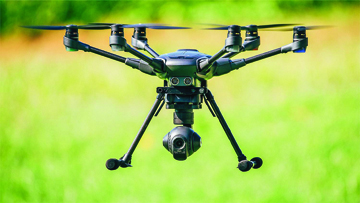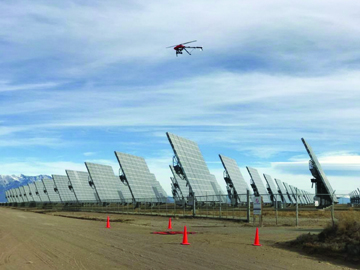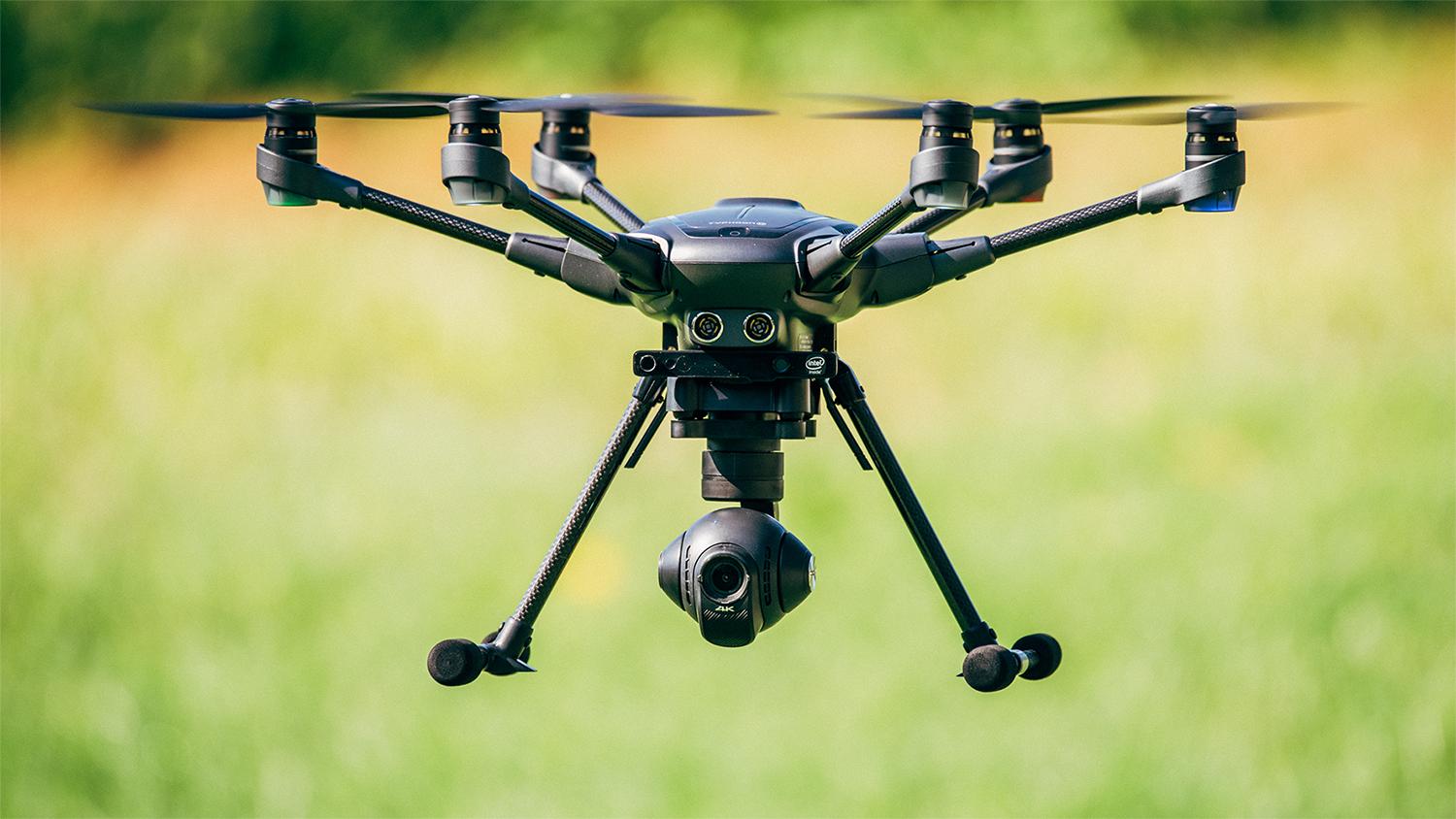Flying Machines Impact Valley’s Workplace, Output; Altering Local Real Estate, Events, Construction, Mining
by Glen Richardson

Drones Over Denver: There are no specific rules for drones in Denver other than they are not allowed in parks or within a five-mile radius of any airport. They are allowed to fly at or below 400 ft., or about as high as a 40-story building.
To be sure drones aren’t yet as American as apple pie. Experts predict, however, that within the next decade unmanned aircraft systems (UAS) or drones will be as indispensable as the cell phones we carry everyday — tools that make us productive, safer and more connected.
Delivery of doughnuts to Denver’s mayor a year ago has thus far been the city’s single significant drone headline. Can’t drones wing it over the Rocky Mountains?
Despite creating little buzz locally, drone dealings are booming and doing double duty in Denver. Consider these examples:
Top Denver Deals
- Xcel Energy is the first utility in the nation to routinely fly drones beyond the operator’s line of sight as it surveys transmission lines around Denver;
- The University of Colorado at Denver offers a Drones 101 course that is the only academic one of its kind in the country;
- Valley drone company Juniper Unmanned has performed unmanned aircraft missions for companies on six continents;
- Drone companies did live demonstr
 ations on the roof of the Convention Center when Denver hosted XPONENTIAL, the world’s largest drone expo this summer; and
ations on the roof of the Convention Center when Denver hosted XPONENTIAL, the world’s largest drone expo this summer; and - Denver-based Lockheed Martin is offering a $2 million prize in its Drone Challenge titled AlphaPilot.
Donut Delivery Dunked
Amazon, Google and Walmart are experimenting with drone delivery but despite the publicity it is not on Denver’s immediate radar. That’s in spite of the successful delivery of donuts to the mayor.
Why? Deliveries require a lot of work, more powerful drones, better battery life and extremely smart systems that can prevent collisions with people, aircraft and power lines.
Drones also need to be able to verify that they’re delivering something to you and that they’re leaving it in a safe place.
Out Of Sight Flights
In January of last year with FAA approval (2017), Xcel Energy began to operate drones within operators’ visual sight for power line inspections. The work established that drones improved productivity and safety without the use of trucks, helicopters or other utility equipment. Xcel inspects more than 320,000 miles of electricity and natural gas infrastructure to ensure the safety and reliability of its energy systems.
This summer the Federal Aviation Administration announced it had also authorized Xcel drone flights out of the operator’s line of sight. The FAA’s decision to allow these flights is unprecedented in the utility industry, the company says. “Xcel Energy is honored to be the first utility to conduct flights that will enhance grid reliability and safety for our employees and the public,” says Ben Fowke, chairman-CEO. “With this groundbreaking decision, we are advancing the use of technology that improves our efficiency and prov

Nation’s First: Xcel Energy is the first in the nation authorized to fly drones beyond the operator’s visual line of sight. Flights are within a designated area north of Denver to inspect assets.
ides cost savings for customers.”
The company is now routinely operating drones beyond the visual line of the operator’s sight within a designated area north of Denver. Licensed pilots remotely operate small, unmanned drones that look like helicopters weighing less than 55 lbs.
Drone Academics
Housed at CU Denver’s College of Engineering & Applied Sciences is a course titled Unmanned Aerial Systems. Often described as Drones 101, it is teaching a new generation of scientists about applications and research opportunities afforded by unmanned aircraft.
Taught by Jeff Cozart who also happens to be the chief executive officer of Juniper Unmanned — the leading drone company in the world — students are taught mission planning, UAS operations, collection procedures, data processing and analysis. Students also study the legal, ethical and economic implications of drone use.
Offered since 2014 and believed to be the only academic course of its kind in the country it has made Denver the nation’s scholastic leader in Unmanned Aerial Systems. Furthermore, Cozart is a member of the Aviation & Aerospace Science faculty at Metropolitan State University of Denver, where he teaches undergraduate courses in unmanned aircraft.
Business-Industry Leader
Valley drone company Juniper Unmanned is the world leader in unmanned aircraft missions for business and industry. Named the 2018 Colorado Company to Watch, the Golden-based firm has conducted operations on six of the world’s seven continents. Among the firm’s clients are Disney, AECOM, Caterpillar, Trimble, Rio Tinto, the U.S. Geological Survey, the Office of Surface Mining, the Bureau of Land Management and Department of Energy.
The company has completed work ranging from complex urban centers to remote, environmentally sensitive locations. Work is conducted from roads, bridges, earthen dams and power plants.
The company also provides drone solutions for commercial, federal, state, and military organizations. The company integrates best-in-class aircraft with the most advanced sensors. When combined with Juniper’s engineered processes, advanced software, and analytics, clients receive unmatched data and actionable intelligence to improve their business.
Has World’s Eye
After considering sites in San Francisco and New York, Propeller Aero, an Australian maker of drone software for construction and mining has landed in a 3,200-sq.-ft. space on Larimer St. downtown.
After closing on a $10 million round of funding in June, the Sydney-based company has hired a dozen Denver employees and expects the number to double. The firm was founded as a drone data company for mining, construction and waste-management in 2014.
Now, Propeller helps companies set up and fly a drone, then stitch together the photos it shoots into a 3D model to show customers how deep a hole has been dug, how much dirt is in a pile or the various gradients of a surface. In addition, the company produces AeroPoints, a hardware square plate that surveyors lay down on a site that collects data from drones.
Photos & Prizes
Commercial drones are revolutionizing Valley mining, construction and civil engineering. Drones are being used to survey building and the surrounding landscape. Equipped with cameras, GPS and rangefinder measurement tools they provide a detailed bird’s-eye perspective of projects. Some construction drones also have thermal imaging scanners that identify hot and cold spots on projects. A cold spot could indicate insufficient installation, hot spots an electrical problem. Drones can also inspect hard-to-reach areas such as the roofs of high-rise buildings.
Denver realtors are now using portfolios of drone photography to sell property. Drone film companies or realtors themselves shoot and use a diverse mix of aerial camera work from a variety of altitudes and angles. Drones are also now commonly used to shoot weddings and other Valley special events. Keeping their feet on the ground, companies such as Littleton’s Lupher Arts Wedding Motion Pictures use these flying machines to capture breathtaking shots.
Finally, Denver-based Lockheed Martin is offering drone enthusiasts a $2 million design prize. The Challenge: Design an artificial intelligence and machine-learning (AI/ML) framework capable of flying a drone though several professional drone racing courses without human intervention or navigational pre-programming.

